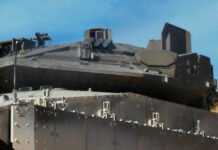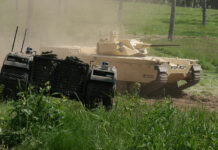The Army, impressed with the design, which was also the most affordable among all contenders, awarded ATK a $50 million production contract for the MGK. Yet, at a cost around $10,000 per unit, XM-395 is not a cheap enough to replace the standard mortar bomb. Nevertheless, it’s pinpoint attack capability is unmatched by any other tactical indirect weapon. Currently there are no plans to install the technology in 81mm and 60mm mortars although industry has promoted potential products to facilitate such capability.
Addressing an urgent Operational Needs Statement (ONS) requesting means to improve mortars precision for the units deployed in Afghanistan, the U.S. Army launched the Accelerated Precision Mortar Initiative (APMI) program in 2009, testing three optional weapons. ATK, General Dynamics Ordnance Technical Systems (GD-OTS), a team of Raytheon and Israel’s IMI, each submitting relatively matured precision guided mortar bombs matching the service’s requirements. ATK was selected to proceed with the development receiving an initial $18.3 million award. A second order worth $50 million was awarded in March 2011.
The new capabilities are bound to attract interest in the international market, as well as among other U.S. services. General Dynamics Ordnance and Tactical Systems continued the development of its patented Roll Control Guided Mortar (RCGM) technology. The company has recently completed a live, tactical firing test of its 120mm RCGM rounds, hitting within 10 meters of their intended target, when fired from ranges of 1,000 to 5,000 meters. The test performed at the Yuma Proving Grounds, Ariz., demonstrated the RCGM capability in height-of-burst, point detonation and delay fuze modes, and demonstrated the rounds’ ability to perform at hot, ambient and cold temperatures. The testing was conducted under a Cooperative Research and Development Agreement (CRADA) with the U.S. Army Armament Research, Development and Engineering Center (ARDEC), Picatinny Arsenal, N.J.
GD-OTS promotes its 120mm RCGM as a low-cost, guided mortar that provides precision-strike capability, using standard M934A1 mortar components, GPS guidance, M734A1 fuze components and patented Roll-Controlled Fix Canard (RCFC) technology. The RCGM employs a larger forward section comprising the GPS receiver, navigation section and GD’s patented Roll-Controlled Fixed Canard (RCFC) system, allowing the mortar to adjust its flight to reach the intended target. The RCGM maintains the same fuze-setting method and function of unguided bombs. Employing existing mortar warheads and fuzing, the RCGM uses add-on control and guidance system, introduces a low cost alternative to purpose-built precision guided munitions designed for artillery and mortars applications. “We can offer a truly affordable precision mortar round for less than $10,000 per unit.” GD claims the recent test demonstrates the maturity of their technology, in offering viable competitive alternative which meets the Army’s requirements for affordable precision munitions, “These tests fully demonstrates the viability of our system with respect to accuracy, fuze reliability and enhanced lethality for the warfighter“ Michael S. Wilson, president of GD-OTS comments.














